Hello everyone and welcome to an exciting edition of #IPSERIES talking about IP protection entertainers can enjoy and our case study for today is Armando Christian Pérez aka Pitbull who has successfully registered a sound mark for EEEEEEEYOOOO!  https://abs.twimg.com/emoji/v2/... draggable="false" alt="👏🏾" title="Clapping hands sign (medium dark skin tone)" aria-label="Emoji: Clapping hands sign (medium dark skin tone)">
https://abs.twimg.com/emoji/v2/... draggable="false" alt="👏🏾" title="Clapping hands sign (medium dark skin tone)" aria-label="Emoji: Clapping hands sign (medium dark skin tone)"> https://abs.twimg.com/emoji/v2/... draggable="false" alt="👏🏾" title="Clapping hands sign (medium dark skin tone)" aria-label="Emoji: Clapping hands sign (medium dark skin tone)">
https://abs.twimg.com/emoji/v2/... draggable="false" alt="👏🏾" title="Clapping hands sign (medium dark skin tone)" aria-label="Emoji: Clapping hands sign (medium dark skin tone)"> https://abs.twimg.com/emoji/v2/... draggable="false" alt="👏🏾" title="Clapping hands sign (medium dark skin tone)" aria-label="Emoji: Clapping hands sign (medium dark skin tone)">
https://abs.twimg.com/emoji/v2/... draggable="false" alt="👏🏾" title="Clapping hands sign (medium dark skin tone)" aria-label="Emoji: Clapping hands sign (medium dark skin tone)">
And also check out his publication with @nyulaw @jipelnyu titled EEEEEEEYOOOOOO!: REFLECTIONS ON PROTECTING PITBULL& #39;SS FAMOUS GRITO.
It& #39;s an interesting read for everyone and I believe entertainers in Nigeria can learn a thing or two from the article.
It& #39;s an interesting read for everyone and I believe entertainers in Nigeria can learn a thing or two from the article.
What are the IP protection available to an entertainer?
Based on our case study I would start with a trademark which as we know helps consumers/fans in this case to identify a brand (entertainer).
A trademark basically protects words, names, phrases, slogans, color,
Based on our case study I would start with a trademark which as we know helps consumers/fans in this case to identify a brand (entertainer).
A trademark basically protects words, names, phrases, slogans, color,
sound as in PITBULL& #39;SS case by distinguishing him from other entertainer.
What is unique about Pitbull& #39;soundmark is that it is the first time in the history of the United States Patent and Trademark Office (USPTO) to issue a trademark for music live video recording,
What is unique about Pitbull& #39;soundmark is that it is the first time in the history of the United States Patent and Trademark Office (USPTO) to issue a trademark for music live video recording,
entertainment services in the nature of live musical performances with registration numbers - 5,877,076 & 5,877,077.
This changes a lot in the musical industry. The EEEEEEEYOOOOOO! is Pitbull& #39;s famous yell or grito (a traditional Mexican shout)
This changes a lot in the musical industry. The EEEEEEEYOOOOOO! is Pitbull& #39;s famous yell or grito (a traditional Mexican shout)
just for recorded and live performance.
Other famous sound marks include:
i. Tarzan& #39;s Yell: The mark is a yell consisting of a series of approximately ten sounds, alternating between the chest and falsetto registers of the voice, as follow -
Other famous sound marks include:
i. Tarzan& #39;s Yell: The mark is a yell consisting of a series of approximately ten sounds, alternating between the chest and falsetto registers of the voice, as follow -
1) a semi-long sound in the chest register, 2) a short sound up an interval of one octave plus a fifth from the preceding sound, 3) a short sound down a Major 3rd from the preceding sound, 4) a short sound up a Major 3rd from the preceding sound, 5) a long sound down one octave
plus a Major 3rd from the preceding sound, 6) a short sound up one octave from the preceding sound, 7) a short sound up a Major 3rd from the preceding sound, 8) a short sound down a Major 3rd from the preceding sound, 9) a short sound up a Major 3rd from the preceding sound,
10) a long sound down an octave plus a fifth from the preceding sound.
iii. The NBC Chimes: comprises a sequence of chime-like musical notes which are in the key of C and sound the notes G, E, C, the "G" being the one just below middle C, the "E" the one just above middle C, and the "C" being middle C, thereby to identify applicant& #39;s broadcasting
service. https://youtu.be/SRMpeACi8tY ">https://youtu.be/SRMpeACi8...
According to a write up by Candida J. Hinton, Kay & Boose, sound Mark can be entertaining, clever and informative and can become famous just like Pitbull& #39;s EEEEEEEYOOOOOO!
However, Sound mark registration may be problematic in two ways:
However, Sound mark registration may be problematic in two ways:
"a. The ability to reduce a sensory mark to a written description may lead to an impression of the mark &
b. Issues accepting a musical score of the mark and providing an image of the score in the database in addition to, or instead of, a written description of the mark."
b. Issues accepting a musical score of the mark and providing an image of the score in the database in addition to, or instead of, a written description of the mark."
Do you think it would be easy registering a sound mark in Nigeria?
As an entertainer do you own any trademark?
Here& #39;s a link to Pitbull& #39;s EEEEEEEYOOOOOO! sound collection made by a fan. See link below https://youtu.be/lCkEHBNLtO4 ">https://youtu.be/lCkEHBNLt...
What the Nigerian entertainment industry can learn from Pitbull& #39;s EEEEEEEYOOOOOO! which he started using as early as 2002 in Miami clubs (to alert his friends that trouble might be escalating).
1. Your unique sound can be trademarked and commercialized.
1. Your unique sound can be trademarked and commercialized.
2. Your sound has to be very unique in order to enjoy trademark protection as seen in Pitbull& #39;s case
3. Right now you can& #39;t use Pitbull& #39;s EEEEEEEYOOOOOO! sound mark without his permission else that would be an infringement as consent is key when it comes to IP.
3. Right now you can& #39;t use Pitbull& #39;s EEEEEEEYOOOOOO! sound mark without his permission else that would be an infringement as consent is key when it comes to IP.
In 2017, A song titled "Mi Gente by J. Balvin, Willy Williams from 0:52-0:56 seconds the EEEEEEEYOOOOOO! sound was sampled and a lot of people thought Pitbull had featured in the music which now led to the remix of the song. https://abs.twimg.com/emoji/v2/... draggable="false" alt="😁" title="Grinning face with smiling eyes" aria-label="Emoji: Grinning face with smiling eyes">
https://abs.twimg.com/emoji/v2/... draggable="false" alt="😁" title="Grinning face with smiling eyes" aria-label="Emoji: Grinning face with smiling eyes">
Do you consider the Pitbull& #39;s mark to be unique enough?
Another form of protection an entertainer will enjoy is under Copyright and Related Rights for their original recordings, performances and broadcast of their work.
Section 26 of the Copyright Act of Nigeria provides that a performer shall have the exclusive rights to control
Section 26 of the Copyright Act of Nigeria provides that a performer shall have the exclusive rights to control
his performance such as performing recording, broadcasting live, reproduction in any material form and adaptation of the performance.
Last year this particular picture below went viral about the different between an artist and an entrepreneur.
As and entertainer you need to build
Last year this particular picture below went viral about the different between an artist and an entrepreneur.
As and entertainer you need to build
and think like a business person which is one of the reasons Pitbull went ahead to register his famous yell.
Section 26 of the Copyright Act further stated that performance will include:
a. A dramatic performance;
b. A musical performance or
c. A reading or recitation.
Section 26 of the Copyright Act further stated that performance will include:
a. A dramatic performance;
b. A musical performance or
c. A reading or recitation.
Protection for musical performance is until the end of the period of fifty (50) years from the end if the year in which the first performance took place. See section 27 of the Copyright Act.
How are Copyright and related right managed for entertainers?
Consent/Permission/license/authorization is key and very important. Before using an entertainers work you must find the right holders, get their permission before you can use their works, then pay a fee(royalty); this
Consent/Permission/license/authorization is key and very important. Before using an entertainers work you must find the right holders, get their permission before you can use their works, then pay a fee(royalty); this
process is called "rights clearance".
Ignorance is not an excuse, always do your due diligence and search before embarking on any project
In order for entertainers to have a work life balance, they rely on the services of collective management organizations (Camps) to help them
Ignorance is not an excuse, always do your due diligence and search before embarking on any project
In order for entertainers to have a work life balance, they rely on the services of collective management organizations (Camps) to help them
receive their payments (royalties) when their works are been used.
In Nigeria, we have:
1. Reproduction Rights Organisations (REPRONIG) CMO representing the creators (authors including writers, photographers and other visual creators and composers) and publishers;
In Nigeria, we have:
1. Reproduction Rights Organisations (REPRONIG) CMO representing the creators (authors including writers, photographers and other visual creators and composers) and publishers;
2. Audio Visual Rights Society (AVRS) CMO for audiovisual works is Nigeria& #39;s sole Collective Management Organization for Cinematography Films,
3. Copyright Society of Nigeria (COSON) CMO for musical works and sound recordings in Nigeria. By the enabling Acts,
3. Copyright Society of Nigeria (COSON) CMO for musical works and sound recordings in Nigeria. By the enabling Acts,
COSON is authorized to license the public and commercial use of musical works and sound recordings.
More on CMO in my next #IPSERIES https://abs.twimg.com/emoji/v2/... draggable="false" alt="😉" title="Winking face" aria-label="Emoji: Winking face">
https://abs.twimg.com/emoji/v2/... draggable="false" alt="😉" title="Winking face" aria-label="Emoji: Winking face">
More on CMO in my next #IPSERIES
Have you ever cleared a work before using it?
Has anyone sought your permission/consent/authorization before using your work?
Do you have an IP Portfolio?
Have you ever considered commercializing your IP?
Exclusive rights a copyright owners is entitled to.
Aside from the moral and economic rights, a copyright owner is entitled to:
a. Right to perform the work publicly
b. Right to distribute copies of the work to the public
c. Right to reproduce the work
Aside from the moral and economic rights, a copyright owner is entitled to:
a. Right to perform the work publicly
b. Right to distribute copies of the work to the public
c. Right to reproduce the work
d. Right to display the work publicly
e. "Right to perform the work publicly by means of a digital audio transmission"
f. Right to prepare derivative works based in the copyrighted works.
Benefits of registering your copyright.
i. Documentation purposes and also create a public
e. "Right to perform the work publicly by means of a digital audio transmission"
f. Right to prepare derivative works based in the copyrighted works.
Benefits of registering your copyright.
i. Documentation purposes and also create a public
record of your work
ii. Have the right to sue an infringer for copyright infringement. In the US, it is mandatory that your work is registered before you can sue for copyright infringement. See the case of Fourth Estate vs. http://Wall-Street.com"> http://Wall-Street.com
ii. Have the right to sue an infringer for copyright infringement. In the US, it is mandatory that your work is registered before you can sue for copyright infringement. See the case of Fourth Estate vs. http://Wall-Street.com"> http://Wall-Street.com
In Nigeria, you can Institute an action at the Federal High Court when your work has been infringer and seek remdies.
Wrapping up
According to @MarkJKings https://abs.twimg.com/emoji/v2/... draggable="false" alt="👇🏾" title="Down pointing backhand index (medium dark skin tone)" aria-label="Emoji: Down pointing backhand index (medium dark skin tone)">
https://abs.twimg.com/emoji/v2/... draggable="false" alt="👇🏾" title="Down pointing backhand index (medium dark skin tone)" aria-label="Emoji: Down pointing backhand index (medium dark skin tone)"> https://abs.twimg.com/emoji/v2/... draggable="false" alt="👇🏾" title="Down pointing backhand index (medium dark skin tone)" aria-label="Emoji: Down pointing backhand index (medium dark skin tone)">
https://abs.twimg.com/emoji/v2/... draggable="false" alt="👇🏾" title="Down pointing backhand index (medium dark skin tone)" aria-label="Emoji: Down pointing backhand index (medium dark skin tone)"> https://abs.twimg.com/emoji/v2/... draggable="false" alt="😁" title="Grinning face with smiling eyes" aria-label="Emoji: Grinning face with smiling eyes">
https://abs.twimg.com/emoji/v2/... draggable="false" alt="😁" title="Grinning face with smiling eyes" aria-label="Emoji: Grinning face with smiling eyes">
Wrapping up
According to @MarkJKings
In conclusion, entertainers are encouraged to explore IP because with it you can think big, brand themselves, explore every form of commercialization and always protect their IP.
Remember consent/permission is very important, until next time bye for now https://abs.twimg.com/emoji/v2/... draggable="false" alt="🥳" title="Partying face" aria-label="Emoji: Partying face">
https://abs.twimg.com/emoji/v2/... draggable="false" alt="🥳" title="Partying face" aria-label="Emoji: Partying face"> https://abs.twimg.com/emoji/v2/... draggable="false" alt="😘" title="Face throwing a kiss" aria-label="Emoji: Face throwing a kiss">
https://abs.twimg.com/emoji/v2/... draggable="false" alt="😘" title="Face throwing a kiss" aria-label="Emoji: Face throwing a kiss">
Remember consent/permission is very important, until next time bye for now

 Read on Twitter
Read on Twitter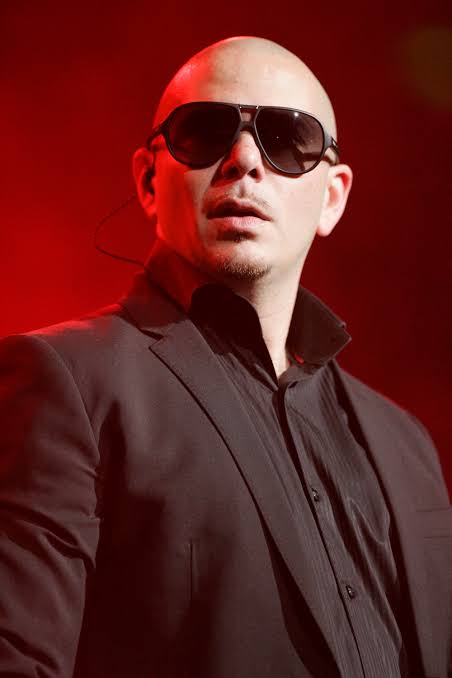 https://abs.twimg.com/emoji/v2/... draggable="false" alt="👏🏾" title="Clapping hands sign (medium dark skin tone)" aria-label="Emoji: Clapping hands sign (medium dark skin tone)">https://abs.twimg.com/emoji/v2/... draggable="false" alt="👏🏾" title="Clapping hands sign (medium dark skin tone)" aria-label="Emoji: Clapping hands sign (medium dark skin tone)">" title="Hello everyone and welcome to an exciting edition of #IPSERIES talking about IP protection entertainers can enjoy and our case study for today is Armando Christian Pérez aka Pitbull who has successfully registered a sound mark for EEEEEEEYOOOO! https://abs.twimg.com/emoji/v2/... draggable="false" alt="👏🏾" title="Clapping hands sign (medium dark skin tone)" aria-label="Emoji: Clapping hands sign (medium dark skin tone)">https://abs.twimg.com/emoji/v2/... draggable="false" alt="👏🏾" title="Clapping hands sign (medium dark skin tone)" aria-label="Emoji: Clapping hands sign (medium dark skin tone)">https://abs.twimg.com/emoji/v2/... draggable="false" alt="👏🏾" title="Clapping hands sign (medium dark skin tone)" aria-label="Emoji: Clapping hands sign (medium dark skin tone)">">
https://abs.twimg.com/emoji/v2/... draggable="false" alt="👏🏾" title="Clapping hands sign (medium dark skin tone)" aria-label="Emoji: Clapping hands sign (medium dark skin tone)">https://abs.twimg.com/emoji/v2/... draggable="false" alt="👏🏾" title="Clapping hands sign (medium dark skin tone)" aria-label="Emoji: Clapping hands sign (medium dark skin tone)">" title="Hello everyone and welcome to an exciting edition of #IPSERIES talking about IP protection entertainers can enjoy and our case study for today is Armando Christian Pérez aka Pitbull who has successfully registered a sound mark for EEEEEEEYOOOO! https://abs.twimg.com/emoji/v2/... draggable="false" alt="👏🏾" title="Clapping hands sign (medium dark skin tone)" aria-label="Emoji: Clapping hands sign (medium dark skin tone)">https://abs.twimg.com/emoji/v2/... draggable="false" alt="👏🏾" title="Clapping hands sign (medium dark skin tone)" aria-label="Emoji: Clapping hands sign (medium dark skin tone)">https://abs.twimg.com/emoji/v2/... draggable="false" alt="👏🏾" title="Clapping hands sign (medium dark skin tone)" aria-label="Emoji: Clapping hands sign (medium dark skin tone)">">
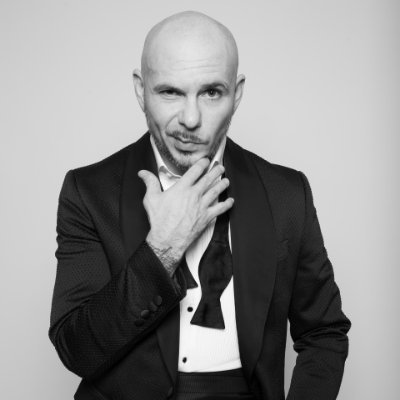 https://abs.twimg.com/emoji/v2/... draggable="false" alt="👏🏾" title="Clapping hands sign (medium dark skin tone)" aria-label="Emoji: Clapping hands sign (medium dark skin tone)">https://abs.twimg.com/emoji/v2/... draggable="false" alt="👏🏾" title="Clapping hands sign (medium dark skin tone)" aria-label="Emoji: Clapping hands sign (medium dark skin tone)">" title="Hello everyone and welcome to an exciting edition of #IPSERIES talking about IP protection entertainers can enjoy and our case study for today is Armando Christian Pérez aka Pitbull who has successfully registered a sound mark for EEEEEEEYOOOO! https://abs.twimg.com/emoji/v2/... draggable="false" alt="👏🏾" title="Clapping hands sign (medium dark skin tone)" aria-label="Emoji: Clapping hands sign (medium dark skin tone)">https://abs.twimg.com/emoji/v2/... draggable="false" alt="👏🏾" title="Clapping hands sign (medium dark skin tone)" aria-label="Emoji: Clapping hands sign (medium dark skin tone)">https://abs.twimg.com/emoji/v2/... draggable="false" alt="👏🏾" title="Clapping hands sign (medium dark skin tone)" aria-label="Emoji: Clapping hands sign (medium dark skin tone)">">
https://abs.twimg.com/emoji/v2/... draggable="false" alt="👏🏾" title="Clapping hands sign (medium dark skin tone)" aria-label="Emoji: Clapping hands sign (medium dark skin tone)">https://abs.twimg.com/emoji/v2/... draggable="false" alt="👏🏾" title="Clapping hands sign (medium dark skin tone)" aria-label="Emoji: Clapping hands sign (medium dark skin tone)">" title="Hello everyone and welcome to an exciting edition of #IPSERIES talking about IP protection entertainers can enjoy and our case study for today is Armando Christian Pérez aka Pitbull who has successfully registered a sound mark for EEEEEEEYOOOO! https://abs.twimg.com/emoji/v2/... draggable="false" alt="👏🏾" title="Clapping hands sign (medium dark skin tone)" aria-label="Emoji: Clapping hands sign (medium dark skin tone)">https://abs.twimg.com/emoji/v2/... draggable="false" alt="👏🏾" title="Clapping hands sign (medium dark skin tone)" aria-label="Emoji: Clapping hands sign (medium dark skin tone)">https://abs.twimg.com/emoji/v2/... draggable="false" alt="👏🏾" title="Clapping hands sign (medium dark skin tone)" aria-label="Emoji: Clapping hands sign (medium dark skin tone)">">
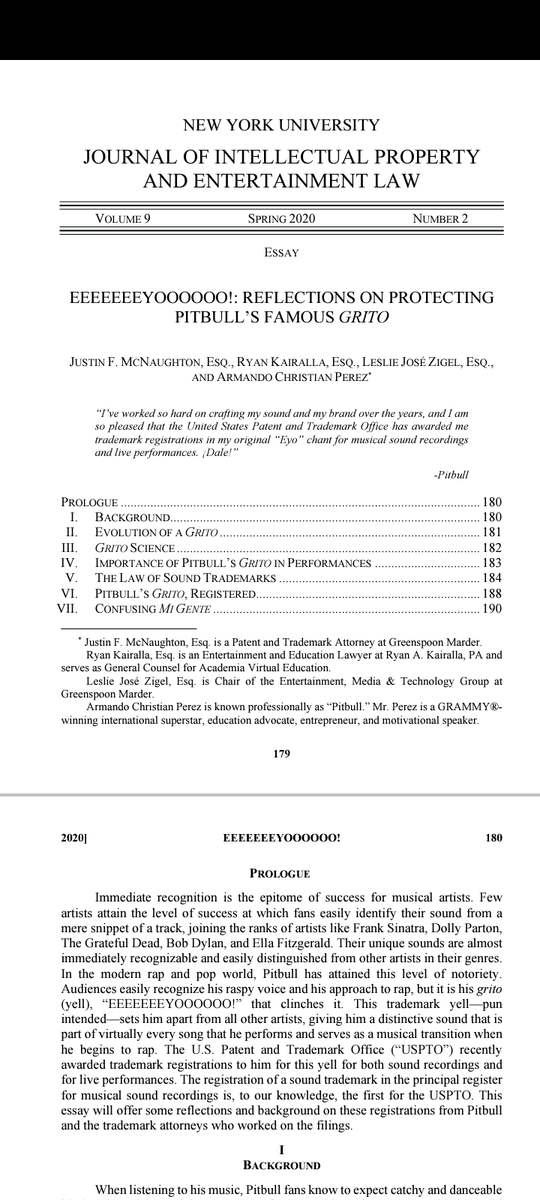

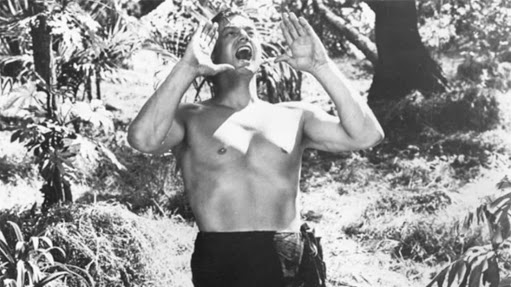
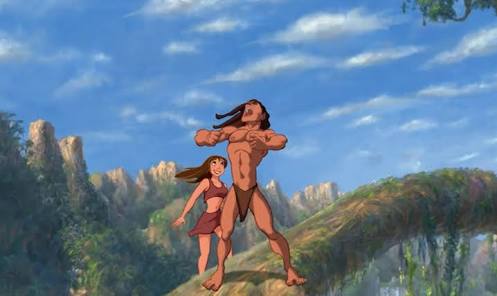
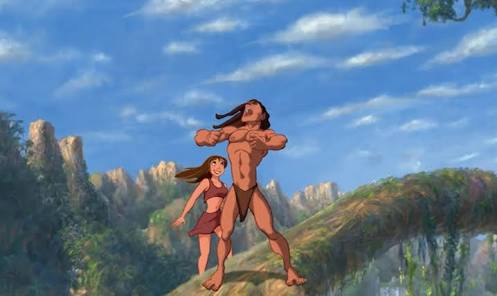
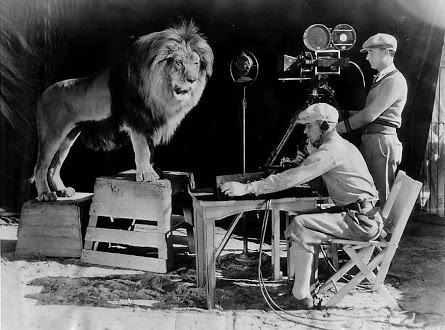
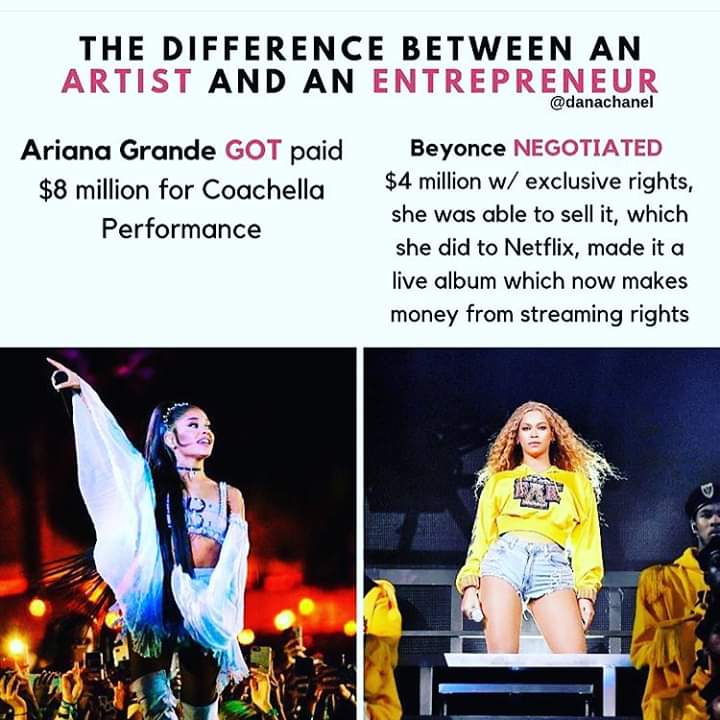
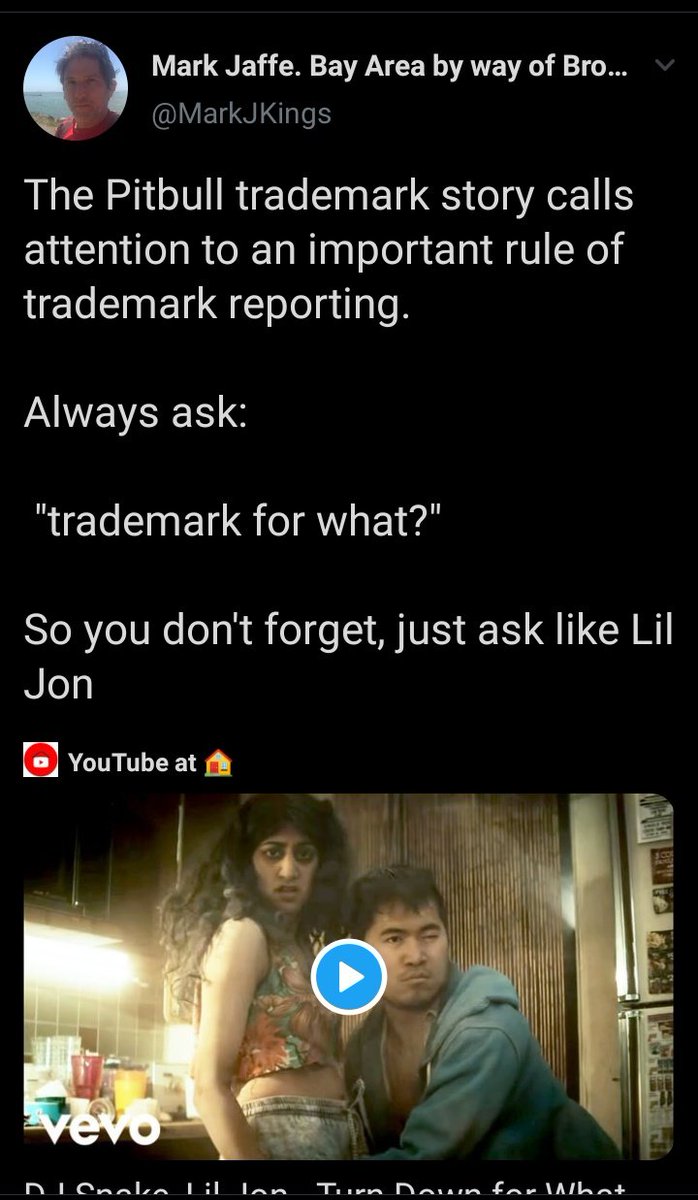 https://abs.twimg.com/emoji/v2/... draggable="false" alt="👇🏾" title="Down pointing backhand index (medium dark skin tone)" aria-label="Emoji: Down pointing backhand index (medium dark skin tone)">https://abs.twimg.com/emoji/v2/... draggable="false" alt="😁" title="Grinning face with smiling eyes" aria-label="Emoji: Grinning face with smiling eyes">" title="In Nigeria, you can Institute an action at the Federal High Court when your work has been infringer and seek remdies.Wrapping upAccording to @MarkJKings https://abs.twimg.com/emoji/v2/... draggable="false" alt="👇🏾" title="Down pointing backhand index (medium dark skin tone)" aria-label="Emoji: Down pointing backhand index (medium dark skin tone)">https://abs.twimg.com/emoji/v2/... draggable="false" alt="👇🏾" title="Down pointing backhand index (medium dark skin tone)" aria-label="Emoji: Down pointing backhand index (medium dark skin tone)">https://abs.twimg.com/emoji/v2/... draggable="false" alt="😁" title="Grinning face with smiling eyes" aria-label="Emoji: Grinning face with smiling eyes">" class="img-responsive" style="max-width:100%;"/>
https://abs.twimg.com/emoji/v2/... draggable="false" alt="👇🏾" title="Down pointing backhand index (medium dark skin tone)" aria-label="Emoji: Down pointing backhand index (medium dark skin tone)">https://abs.twimg.com/emoji/v2/... draggable="false" alt="😁" title="Grinning face with smiling eyes" aria-label="Emoji: Grinning face with smiling eyes">" title="In Nigeria, you can Institute an action at the Federal High Court when your work has been infringer and seek remdies.Wrapping upAccording to @MarkJKings https://abs.twimg.com/emoji/v2/... draggable="false" alt="👇🏾" title="Down pointing backhand index (medium dark skin tone)" aria-label="Emoji: Down pointing backhand index (medium dark skin tone)">https://abs.twimg.com/emoji/v2/... draggable="false" alt="👇🏾" title="Down pointing backhand index (medium dark skin tone)" aria-label="Emoji: Down pointing backhand index (medium dark skin tone)">https://abs.twimg.com/emoji/v2/... draggable="false" alt="😁" title="Grinning face with smiling eyes" aria-label="Emoji: Grinning face with smiling eyes">" class="img-responsive" style="max-width:100%;"/>


